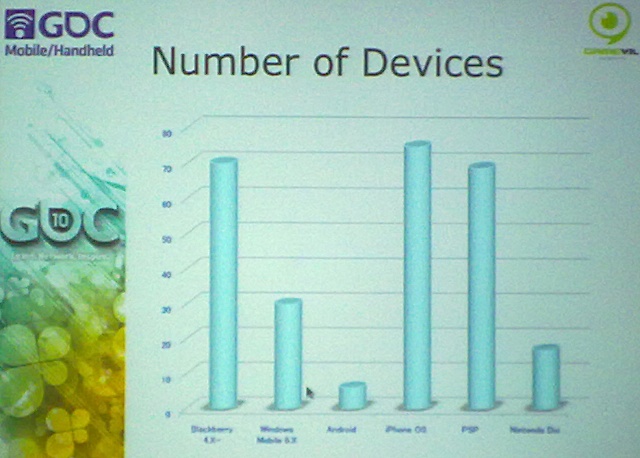Maarten Noyons (founder of the International Mobile Games Awards) pointed this fact out in his talk about publishing in a multi-store environment; and also reminded everyone that the world of app stores adds yet another layer of fragmentation for developers and companies to try and navigate.
Unlike the desktop gaming market, which has three main OS's (Windows, Mac and Linux) or the home consoles' three systems (PS3, Xbox or Wii), the mobile market has a staggering twelve main flavours of Operating Systems to choose from. And it doesn't end there, because inside each of those OS's there are various handset restrictions, language limitations and technological issues that need to be understood before you decide where you are going to program your killer application.
Now on top of all this is the addition of the App Store 'regulations'. Be it the standalone stores, such as Handango, the glut of OEM Stores (the Apple iPhone Store, Nokia's Ovi, and similar), each app store has its own demands and rules to follow. Given that ultimately you'll be placing your code in only one or two stores, you are going to have to be aware of all the stores and how they could affect your business.
I found it staggering that one speaker, Kyu Lee of gamevil.com, could not articulate, even in broad strokes, what risk assessment Gamevil had done on the various App Stores that they considered using when launching their company. It was also interesting watching him being called out by Oliver Gunasekara of the Symbian Foundation for leaving the Symbian handset numbers off his bar graph used in justifying which platform was the best developer target.

Where is Symbian and S60?
Because right now, for a new developer, choosing a platform has as much to do spinning a roulette wheel in Las Vegas as with careful research. You could make yourself dizzy with the options; do you go with the hyped success and sticky users of Apple's App Store and leave your execution in the hands of “will I make it on a Top List?” Would you prefer to go with the biggest addressable market in the Nokia Ovi store, which has a partially fragmented platform of two editions and various feature packs and none of the kudos of the association with Apple? Perhaps you'd rather be the biggest fish in the smaller ponds of the Android Store and hope that when (if?) it starts on an exponential growth curve you can stay on top?
And through all this, you still have the classic problems of choosing which language to use and the tools you'll employ to do the actual development.
While all this might seem a huge headache, the consensus seems to be that the rise of App Stores is a good thing for business. It gives the end-users a single point of contact for new applications, with billing, updates and discovery all standardised on their handsets. Unfortunately, the problems that App Stores fix are more on the business side of the equation, and not on the issues that plague developers.
Lee's advice sounds very traditional, and in a sense this is a good thing. While the issues are new, good planning and analysis (even if it is costly in terms of time or finance to work through) is the key to making the most of the fractured landscape. Every developer, from the lone indie to the massive development houses should be aware of their strengths in four key areas (their brand, how they develop, the distribution routes they can use, and the budget available) and how these interact with the app stores they choose to use.
Because the rewards are huge. Noyons re-iterated the huge market in mobile... the installed base of PC's (all varieties) in the home is in the order of 850 million; television is 1.9 billion consumers, while mobile users are a staggeringly attractive 3.3 billion strong.
App Stores are not the final answer to the problems of distribution, advertising, marketing and retailing. They are a different beast to anything else in the landscape. They provide a large captive audience to developers, but never forget that audience is even more fickle and transient than the one that comes by your website.
Like any tool, if you can understand the risks then you can minimise those, while maximising the advantages each store has. That is what gives your product the best chance of success. Every problem needs to be analysed and overcome – app stores are just the latest wrinkle. They're not showstoppers, but neither do they guarantee a hit.
-- Ewan Spence, March 2010.
